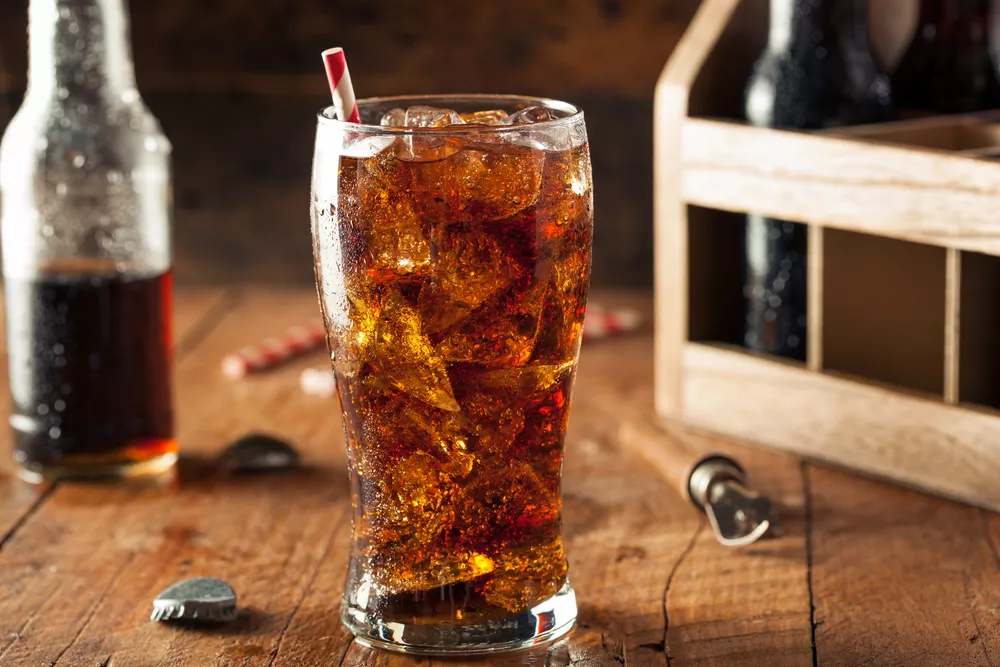Verified on 03/25/2024 by Alexane Flament, Editor
Sodas are as popular among young people as they are among adults. Refreshing and pleasant tasting, it’s hard to stop after the first sip.
In some cases, they even constitute the majority of liquids consumed during the day. However, being too sweet and nutritionally poor, they are harmful to the body.
PasseportSanté gives you 8 good reasons to stop drinking sodas.
Sodas promote weight gain
It’s no secret that sodas contain on average 100 g of sugar per liter, or 20 g per glass (the equivalent of 4 lumps of sugar), which is far too much compared to WHO recommendations. which recommends not exceeding 50 g of sugar per day.
However, when dietary sugar intake is higher than requirements, the excess must be stored. It is first stored by the liver and muscles in the form of glycogen, but the storable quantity is quickly limited.
Fats then constitute a second form of storage: sugars are transformed into triglycerides and stored mainly in fat cells, especially in the abdominal area.
Thus, it has been proven that the sugar in soda is strongly involved in the phenomena of overweight and obesity, especially since a study carried out on American adolescents showed a correlation between soda consumption and poor hygiene. life: less than 8 hours of sleep per night, more than 2 hours of television per day and a lack of physical activity.
In addition, soda consumption would slow down the metabolism, which means that the body burns less fat and expends less energy, another factor that promotes weight gain.
Sodas make you eat more
The insulin spike following the ingestion of an excessive quantity of sugar awakens the feeling of hunger. Indeed, insulin induces resistance to leptin, the hormone that regulates appetite.
Conversely, researchers who subjected rats to a diet without sugar, and more precisely without fructose, which is found in large quantities in American sodas, succeeded in overcoming their resistance to leptin, without reducing their fat intake.
So, when we consume sodas, the feeling of satiety is never felt. Furthermore, since sodas lead to sugar dependence, there is a greater risk that the feeling of hunger will be compensated by foods rich in carbohydrates (biscuits, pastries, pasta, bread, potatoes, etc.).
Sugar addiction actually tends to transform our sense of taste, making it more difficult to enjoy a raw food without added sugar, like fruit.
The soda consumer therefore enters a spiral where sugar calls for sugar, often leading to overconsumption of calories. Additionally, composed primarily of carbonated water and sugar, sodas lack fiber, vitamins, minerals and other essential nutrients.
They therefore represent empty calories for the body.
Soda increases the risk of type 2 diabetes
Sodas, due to their high sugar content and their ability to raise blood sugar levels and therefore cause insulin spikes, can ultimately lead to insulin resistance. This means that sugar is used less well by the body, which results in a higher blood sugar level. However, insulin resistance often precedes type 2 diabetes.
In a study carried out in 2014, 2,037 Japanese employees were followed for 7 years. 170 of them contracted diabetes 2 during the study. Researchers have found a correlation between the consumption of sodas, whether classic or diet, and an increased risk of diabetes.
In another study carried out in 2009, the effects of diet soda exclusively were studied on the risks of diabetes. Again, consumption of at least 1 soda per day was associated with a 67% increased risk of contracting diabetes 2 compared to no consumption.
The cause and effect link between sodas and diabetes 2 is not proven by these studies, because the participants may at the same time have a poor lifestyle, but they very probably constitute an aggravating factor.
Sodas contain potentially carcinogenic substances
Sodas contain a number of additives and sweeteners, including the famous aspartame, which makes up the majority of diet drinks. Aspartame is the subject of much controversy because it may have carcinogenic effects.
Although several studies demonstrate no link between aspartame ingestion and cancer risks, a study carried out in 2014 on rats and mice showed the carcinogenic potential of aspartame.
After ingestion, aspartame would transform into methanol and release potentially carcinogenic substances such as formaldehyde and formic acid.
Aspartame is not the only additive to divide: caramel coloring (E150d on the label) used in cola drinks is also suspected of being carcinogenic.
Indeed, under the effect of heat, the dye can form a chemical compound, 4-methylimidazole (abbreviated 4-MEI) which would be toxic to the body in high doses (360 mg per kilo of body weight).
A 2012 study on rats confirmed this risk. The dye is also banned in California, but once again not all studies agree on its carcinogenic power.
Sodas promote demineralization
Generally speaking, it is important to maintain a balance between calcium and phosphorus in the body. These two minerals play an important role in bone metabolism: the ratio between phosphorus and calcium must be between 0.8 and 1 for good calcification.
If an excess of phosphorus is well tolerated by the body, it can in the long term cause decalcification, because in this case it reduces the absorption of calcium.
However, phosphoric acid is used in non-alcoholic drinks as a pH regulator, and mainly in cola sodas.
Thus, a study carried out on adolescent girls and young women aged between 10 and 22 showed a correlation between soda consumption and a lower level of calcium in the blood, as well as a higher concentration of calcium and phosphorus in the blood. the urines. This calcium deficiency would ultimately increase the risk of osteoporosis.
Sodas cause cavities
As has already been mentioned, sodas are rich in added sugars, but it is widely recognized that these are strongly involved in the appearance of dental cavities. The demineralization that soda can cause also affects the teeth by causing erosion of the enamel.
A study carried out in the United States has also shown that soda consumption is responsible for the development of cavities in young children. It is the acids (phosphoric, citric, etc.) present in sodas that cause enamel erosion.
For example, water has a neutral pH of 7 when normal Coca-Cola has an acidic pH of 2.4.
So, adult or child, it is preferable to limit your soda consumption to maintain good dental health.
Sodas cause behavioral problems
Regularly drinking soda is associated with an increase in violent behavior, particularly among children and adolescents. A study was carried out in 2013 on 2,929 5-year-old children, 43% of whom consumed at least 1 soda per day (the frequency could go up to more than 4 per day).
The results showed that children who consumed at least 1 soda per day had more aggressive and destructive behavior than those who did not consume soda at all. In addition, those who consumed at least 4 sodas per day had more attention problems than others.
The same researchers carried out another study in 2014, this time on American high school students. They came to similar conclusions: a greater propensity to fight, but also a greater risk of suffering from sadness, depression, and even suicidal thoughts and behaviors, these increasing proportionally to the daily quantity soda.
Although cause and effect has not been proven in these studies, it is assumed that these results are due to the caffeine content of sodas, which can cause impulsivity and depression, among other things.
Sodas increase the risk of heart attacks
Several groups of researchers have come to the conclusion that the consumption of sodas, and more specifically sodas low in sugar, increases the risk of having a heart attack.
A study carried out in 2012 and which observed cases of heart attacks in 1,416 men and 2,938 women showed that people who consumed the most sodas, whether classic or diet, were more likely to make heart attack.
Replacing soda with other drinks (such as coffee, decaffeinated or not) reduced the risk of heart attack by around 10%.
However, these studies are sometimes criticized for being of poor quality: considering the factor of soda consumption in isolation is irrelevant, because it is lifestyle in its entirety that can have an impact on cardiovascular risk.
Thus, it is possible that people who love soda are also fans of fast food and remain not very active. The correlation between soda consumption and increased risk of heart attack therefore still raises doubts.
93% Readers found this article helpful And you ?
Was this article useful to you?












